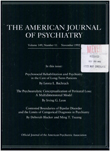Law, science, and psychiatric malpractice: a response to Klerman's indictment of psychoanalytic psychiatry
Abstract
The Osheroff litigation, which is central to Klerman's paper, ended in an out-of-court settlement. The author states that there is no legal precedent for the so-called right to effective treatment and that the case history was a much more complicated clinical scenario than Klerman reports. He concludes that there is neither in the law nor in the clinical facts a sound or certain basis for Klerman's conclusions or for the sweeping policy reforms and standardized clinical procedures he urges. Although they are directed against traditional psychoanalytic psychiatrists, Klerman's proposals could have serious consequences for the innovation, diversity, and independent thought essential to scientific progress in psychiatry.
Access content
To read the fulltext, please use one of the options below to sign in or purchase access.- Personal login
- Institutional Login
- Sign in via OpenAthens
- Register for access
-
Please login/register if you wish to pair your device and check access availability.
Not a subscriber?
PsychiatryOnline subscription options offer access to the DSM-5 library, books, journals, CME, and patient resources. This all-in-one virtual library provides psychiatrists and mental health professionals with key resources for diagnosis, treatment, research, and professional development.
Need more help? PsychiatryOnline Customer Service may be reached by emailing [email protected] or by calling 800-368-5777 (in the U.S.) or 703-907-7322 (outside the U.S.).



